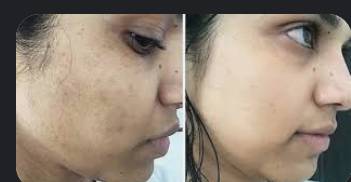Whenever you get a pimple, you probably want it to heal quickly. But sometimes, acne blemishes leave a dark mark on your skin even after the pimple is gone. This is frustrating, but not uncommon.
Getting rid of these dark spots on your skin starts with understanding what causes them in the first place.
When a pimple pops up on your skin, it’s technically a form of inflammation. And as your skin heals and new skin cells form, it’s possible that the cells sent to help restore your skin’s smooth surface contain too much melanin.
Melanin is what gives your skin its color, and when certain cells have more melanin than others, the result is a darker patch of skin. This is referred to as post-inflammatory hyperpigmentation.
Anything that makes your skin inflammation last longer, like picking or squeezing a blemish, can increase your chances of post-inflammatory hyperpigmentation.
People who have naturally darker skin tones are more prone to this condition. Keep reading to find out more about how to treat those post-pimple dark spots and how to avoid them in the future.
Treating dark spots from acne is different than treating acne scars. Scars require tissue to be damaged or overgrown. Scars are difficult to fully remove, and while they may fade over time, they usually remain visible.
Dark spots from acne, on the other hand, are flat against the surface of your skin. They don’t indicate any long-term damage to your skin cells, pores, or follicles.
It can take a while, but dark spots tend to become lighter over time, and eventually go away completely. It can take anywhere from 3 months to 2 years for them to vanish from view.
That doesn’t mean you have to wait forever in hopes that your dark spots will fade. There are plenty of home remedies, over-the-counter (OTC) products, and even dermatology treatments you can try to get rid of them more quickly.
If you’d like to treat post-inflammatory hyperpigmentation, you can start with home remedies. Unfortunately, many of these home remedies have only anecdotal evidence to back them up. For the most part, there’s little harm in giving them a try.
Vitamin C
Lemon juice is rich in vitamin C, which can brighten skin and even skin tone. Vitamin C
Aloe vera
If you look online, you’ll find many fans of using aloe vera to heal dark spots from acne. It’s true that aloe is an exceptional healing agent, especially when it comes to your skin.
An
Grapeseed extract
Grapeseed extract is another natural product that may work to help lighten dark spots.
There aren’t any studies on the topical use of grapeseed extract for this purpose. But there is a
Sun protection
According to
There are also plenty of OTC treatments for dark spots that you can try if home remedies aren’t helping. Active ingredients for these types of products vary widely, but some have been shown to be more effective than others.
These ingredients stop the synthesis of melanin in dark spots while peeling off old skin and encouraging new growth. But some products carry a risk of removing too much pigment from your skin, resulting in hypopigmentation.
Speak to your dermatologist before trying OTC products to get rid of dark spots caused by acne.
Once you’ve received your doctor’s OK, look for products that contain some mix of the following ingredients:
- retinoids (vitamin A)
- vitamin E (tocopherol)
- alpha hydroxy acids (AHA), such as mandelic acid
- kojic acid
- azelaic acid
As a next step up from OTC treatments, you may want to look into treatments you can only get in a dermatologist’s office. Treatments for dark spots aren’t typically covered by health insurance, as post-inflammatory hyperpigmentation doesn’t pose a danger to your health.
Keep in mind as you consider this treatment that most, if not all, of the costs will come out of your own pocket.
Chemical peels
Chemical peels are done to remove damaged skin cells and reveal younger-looking skin underneath. The cost can vary, but expect to pay in the range of $600 or more out of pocket.
Chemical peels involve applying a strong solution of different topical acids to your face. The peel is then removed, taking layers of skin cells along with it.
Microdermabrasion
Microdermabrasion typically costs around $150. It uses a device that blasts tiny particles at certain areas of your skin, or a diamond-tipped device is rubbed over your skin.
Microdermabrasion is a next-level exfoliating treatment that aims to buff away imperfections and leave your skin looking smooth and evenly toned.
It’s often used to target dark spots, including ones caused by acne. This treatment is considered lower risk and minimally invasive.
Laser resurfacing
Laser skin resurfacing uses different types of lasers to remove dead skin from your body while encouraging new cells to grow in the deeper layers of your skin. Lasers can be a way to break up scar tissue and correct dark spots caused by acne.
The cost of this treatment varies according to the type of lasers that are used and how many rounds of treatment you need. Expect it to cost between $1,000 and $2,000 per treatment.




No comments yet
Be the first to share your thoughts!